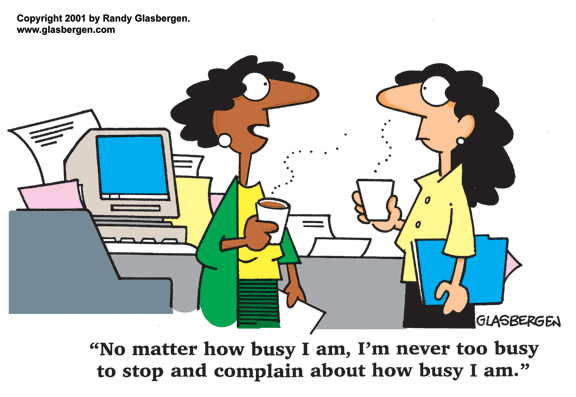Just Say No
|
What can you say no to or delegate?
Let's face it, we are busy and there are items we could simply say no to, delegate to others or allow time to process before committing to saying yes to an activity you may really want to skip. In our working world, back to back meetings give no time for processing and reflection. In his Harvard Business Review blog, DeLong lamented that the "busyness trap" is so ingrained in the American corporate culture that people don’t even know what to do when they are not busy. |
Harvard Business Review The Busyness Trap by Thomas J. DeLong
I frequently talk to MBA students about their careers and aspirations for life. Some of these students worked on Wall Street, and when we talk, a number of them admit that the key to their success was creating the illusion of hard work. One said that he and the other associates would leave their suit coats on their chairs at the end of the work day to make it seem that they hadn’t left for the night — that they were somewhere in the building doing work — when in fact they had gone home.
“We have these little tricks of the trade to create the impression that we are absolutely committed to the organization, even when we don’t have any work,” he told me. “It’s part of managing expectations and our images.”
The trap of busyness is so much a part of corporate culture that many times it clouds our vision of what’s really going on. We expect to be busy; we don’t know what to do when we’re not. The trap of busyness causes us to move with such mindless speed that we’re like the proverbial chicken running around with his head cut off. We plunge into our emails and meetings with a manic energy that forbids reflection, deeply honest conversations, and breaks from the routine.
Many chronically busy people may not even be consciously aware of the extent to which the busyness trap controls their lives. Are you one of these people? The following questions are a good indicator of where you fall on the busyness spectrum:Once you recognize your impulse to cling to minor and relatively meaningless tasks, you are in a better position to let go of some of them. And how do you let go? Admittedly, it’s tough to break the habit of checking texts and e-mails 24/7. While everyone has to find his or her best way of getting these behaviors under control, here are some tactics that you may find useful:
- Do you believe your work allows you to move toward a specific and important goal — greater responsibility, learning a key new skill, achieving a capstone position?
- Do you find yourself attempting to create the appearance that you’re busier than you really are? Do you start typing furiously on your computer when your boss walks in your office? Do you make it a point to emphasize how much travel you’ve undertaken on the company’s behalf and the sacrifices you’ve made? Do you usually mention to your colleagues how late you’ve worked, how you spent the weekend working on a project, or how many e-mails you have to respond to?
- Are you addicted to your smartphone? Are you constantly checking for messages? Are you unable to sustain conversations with work colleagues or family or friends without regularly checking?
- When things slow down at work, do you feel guilty? Do you find it impossible to take a vacation when things are slow? Do you attempt to fill your free work time with meaningless and boring tasks?
- If you’re busy, what percentage of that work is meaningful and challenging? What percentage could be delegated to a subordinate without any dropoff in effectiveness? What percentage could be ignored completely without negative consequence?
- Have your family or friends ever commented on your need to feel important? Do they make fun of your inability to stop talking about work-related matters or enjoy personal time without communicating via cell phone or email?
You don’t have to go from manically busy to a state of Buddha-like contemplation, nor should you. As a driven, ambitious professional, you’re not going to be happy or productive if you aren’t engaged in meaningful work tasks. The goal here is to escape the busyness trap, and you can do so if you just learn to manage the behaviors that make you frantic rather than eliminate them. This will free you to make more significant changes in how you work, providing you with the time and perspective to try new ideas and approaches.
- Impose a one-hour per day electronic blackout period. Force yourself to designate this period during the workday to engage in reading, writing, or reflection and avoid electronic busywork.
- Borrow a page from academics and establish office hours. Designate times when your office is open for people to come in and talk with you about anything besides specific job tasks; use this time to have relaxed dialogues rather than objective-driven exchanges.
- Reduce your worst busyness behavior in small increments. If you average four hours a day on the phone, try to reduce that time by 15 minutes; if you average 100,000 air miles annually, try to cut back to 80,000 miles.
Thomas J. DeLong is the Philip J. Stomberg Professor of Management Practice in the Organizational Behavior area at Harvard Business School and the author of Flying Without a Net. His research focuses on the challenges facing individuals and organizations in the process of change.
